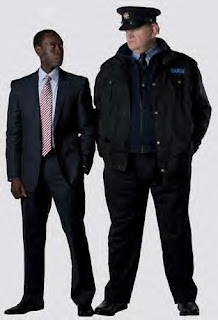There's a scene in the Scott Ridley adaptation of the Joseph Conrad tale, The Duellists, where the mistress of the protagonist goes to a tarot card reader to get insight into her personal dilemma. The seer throws the decision back at her with the moon card and the path between the two dogs. Tells her the cards say she must make her own decision. Well done, I think.
For the decisions are not in the cards but in ourselves. I'd be glad if I could make a living by explaining that to people. Card reading started out as a parlor game and evolved into a method of hyped divination used by con artists to fleece the gullible. But it is still a parlor game too, more fun than an ouija board, and the tarot cards themselves are sometimes interesting works of art.
There are authors who work tarot cards into their books as symbolic tools of the subconscious, and the most significant example of this may be in Cormac McCarthy's Blood Meridian. In the novel, members of the gang have their fortunes told by a gypsy card reader. The protagonist, who is known only as "the child" and then as "the kid" and late in the novel as "the man," draws the four of cups.
Well, the legend is that McCarthy saw the four of cups in a dream, nailed to the wall of a house (which is described in the novel), not knowing what the card meant. John Sepich, a longtime friend of McCarthy, devoted a full chapter in his famous Notes On Blood Meridian to "Tarot and Divination." It is his opinion that the interpretation four of cups is the key to understanding the meaning of the novel.
The four of cups is a rather blue-collar, low ranking card, a bit like the four of spades in a regular deck. Even in Stuart R. Kaplan's massively illustrated three-volume Encyclopedia of Tarot, the four of cups doesn't get much space and hardly any illustrations. Rank is not so important in divination, however, and a card's meaning usually depends on what company it keeps.
Details vary greatly from deck to deck, but the gist of the card is this: A young man or woman sits with their back to a tree, gazing rather blankly at three cups, which are sometimes on their sides, empty. The idea is that of angst, a disappointment with material things. Meanwhile, out of the sky--or out of the subconscious--a hand from out of nowhere offers a better cup, or perhaps a spiritual awakening.
Not all tarot decks conform to this narrative regarding the four of cups, but most have something like it. Sepich cites sources to say that this card is associated with mercy and a divided heart. That, in the McCarthy novel, it foretells the kid's later display of mercy in the desert, and it is for that reason that the Judge eventually destroys him.
There of course is more of the tarot in Blood Meridian, but the dim light of humanity that persists in the novel is built around the evolution of empathy in "the kid," who becomes "the man" in the narrative directly after giving mercy to the old woman in the desert. Mercy was an act of free agency and marked the kid's coming of age.
Novels, like tarot cards, are subject to different interpretations, but I certainly agree with John Sepich on this. McCarthy stresses the notion of the subconscious, and his novels are deeply layered. If you want to know about the historical references in the novel, Sepich's work is not to be missed. He also maintains a site, link, on the web in association with Christopher Forbis and some other McCarthy scholars, which includes concordances of the novels.
Then too, over at Ken's Occult McCarthy site, link, there are more detailed references to freemasonry, the tarot, parodies of McCarthy's prose, and much more. And of course, there are always many serious interpretations being discussed at the Cormac McCarthy Society, link. I've talked about McCarthy's works in this blog several times, including a Wednesday's Western review of Blood Meridian at this link.
We've seen a surge in the number of artistic tarot decks lately, or so it seems to me. I can recall when there were only two or three different styles available, but now they seem without number. It would not surprise me if someone soon came up with a Blood Meridian Tarot Deck, if they haven't already done so.
Scott Ridley has been named the director of the new Cormac McCarthy movie, The Counselor--in case you haven't heard. The cast includes Michael Fassbender and possibly Brad Pitt or Javier Bardem. And of course McCarthy has long been said to be putting on the finishing touches to his newest novel, The Passenger. James Franco is still trying to make movies of both Blood Meridian and Child of God.
We'll see.
_______
_______





.jpg)












.jpg)



































